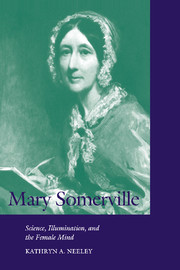Book contents
- Frontmatter
- Contents
- Author's Preface
- Key to Parenthetical References to the Works of Mary Somerville
- Prologue: Perceiving What Others Do Not Perceive: The “Peculiar Illumination” of the Female Mind
- 1 Head among the Stars, Feet Firm upon the Earth: The Problem of Categorizing Mary Somerville
- 2 Creating a Room of Her Own in the World of Science: How Mary Fairfax Became the Famous Mrs. Somerville
- 3 Science as Exact Calculation and Elevated Meditation: Mechanism of the Heavens (1831), “Preliminary Dissertation” (1832), and On the Connexion of the Physical Sciences (1834)
- 4 The Earth, the Sea, the Air, and Their Inhabitants: Physical Geography (1848) and On Molecular and Microscopic Science (1869)
- 5 Mary Somerville on Mary Somerville: Personal Recollections (1873)
- 6 Memory and Mary Somerville: In the Public Eye and Historical Memory
- Epilogue: Science, Voice, and Vision
- Selected Bibliography
- Index
Prologue: Perceiving What Others Do Not Perceive: The “Peculiar Illumination” of the Female Mind
Published online by Cambridge University Press: 30 March 2010
- Frontmatter
- Contents
- Author's Preface
- Key to Parenthetical References to the Works of Mary Somerville
- Prologue: Perceiving What Others Do Not Perceive: The “Peculiar Illumination” of the Female Mind
- 1 Head among the Stars, Feet Firm upon the Earth: The Problem of Categorizing Mary Somerville
- 2 Creating a Room of Her Own in the World of Science: How Mary Fairfax Became the Famous Mrs. Somerville
- 3 Science as Exact Calculation and Elevated Meditation: Mechanism of the Heavens (1831), “Preliminary Dissertation” (1832), and On the Connexion of the Physical Sciences (1834)
- 4 The Earth, the Sea, the Air, and Their Inhabitants: Physical Geography (1848) and On Molecular and Microscopic Science (1869)
- 5 Mary Somerville on Mary Somerville: Personal Recollections (1873)
- 6 Memory and Mary Somerville: In the Public Eye and Historical Memory
- Epilogue: Science, Voice, and Vision
- Selected Bibliography
- Index
Summary
It is impossible to be a mathematician without being a poet in soul. … the poet has only to perceive that which others do not perceive, to look deeper than others look. And the mathematician must be able to do the same thing.
–Sónya KovalévskyNotwithstanding all the dreams of theorists, there is a sex in minds. One of the characteristics of the female intellect is a clearness of perception. … when women are philosophers, they are likely to be lucid ones; … when they extend the range of their speculative views, there will be a peculiar illumination thrown over the prospect.
–William Whewell, Review of On the Connexion of the Physical Sciences (1834) by Mary SomervilleThree large windows with extensive views dominate the room in which I wrote most of this book. As I immersed myself in the scientific writings of Mary Somerville and looked at the world outside through the lenses her writing provided, those very familiar views took on an entirely new aspect, and the world of nature became much more vast, vivid, and dynamic than I had ever imagined it could be. My own powers of perception had been expanded as I watched Somerville exercise hers. I hope I have succeeded in conveying the power of Somerville's transforming vision. Its power derives in large part from Somerville's ability to use science to heighten perception and stimulate imagination.
The utilitarian goals commonly associated with science often overshadow its other functions.
- Type
- Chapter
- Information
- Mary SomervilleScience, Illumination, and the Female Mind, pp. 1 - 10Publisher: Cambridge University PressPrint publication year: 2001

